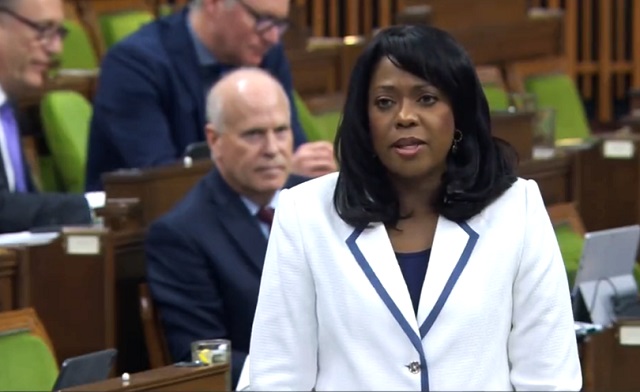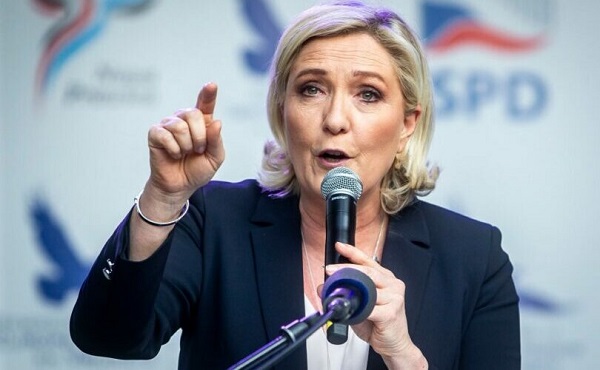Great Reset
Leslyn Lewis warns WHO pandemic treaty amendments violate Canadian sovereignty

From LifeSiteNews
The WHO amendments were adopted despite thousands of Canadians appealing for their rejection.
Conservative MP Leslyn Lewis has blasted that the World Health Organization’s (WHO) new International Health Regulations (IHR), warning they will compromise Canada’s sovereignty.
On December 19, Dr. Leslyn Lewis, Conservative Member of Parliament (MP) for Haldimand-Norfolk, Ontario, condemned Health Minister Mark Holland for failing to protect Canada’s sovereignty by consenting to pandemic amendments put forward by the WHO, which give the international organization increased power over Canadians.
“Canada consented to the amendments to the WHO’s International Health Regulations (IHR), which limits Canada’s time to respond to further amendments, despite thousands of Canadians signing a petition expressing their concerns,” Lewis wrote on X, formerly known as Twitter.
Canada consented to the amendments to the WHO’s International Health Regulations (IHR), which limits Canada’s time to respond to further amendments, despite thousands of Canadians signing a petition expressing their concerns.
See my letter below outlining why the response to… pic.twitter.com/1AZ63ebHX3
— Dr. Leslyn Lewis (@LeslynLewis) December 19, 2023
In October, Lewis endorsed a petition demanding the Liberal government under the leadership of Prime Minister Justin Trudeau “urgently” withdraw from the United Nations and its subgroup, the World Health Organization (WHO), due to the organizations’ undermining of national “sovereignty” and the “personal autonomy” of citizens.
The petition was signed by nearly 19,000 Canadians despite only being open for 30 days. It warned that the “secretly negotiated” amendments could “impose unacceptable, intrusive universal surveillance, violating the rights and freedoms guaranteed in the Canadian Bill of Rights and the Charter of Rights and Freedoms.”
However, despite Canadians’ concerns, the Trudeau government adopted the amendments proposed by the WHO. The new amendments reduce the time for “rejecting any future amendments to the IHR (2005) from 18 months to 10 months” and “implementing future changes into Canadian domestic law from 24 months to 12 months.”
According to Lewis, the amendments alter the original treaty by failing to provide sufficient time for Canadians to consider changes to the agreement before they are scheduled to take effect.
Lewis further explained that the amendments were first presented at the 75th World Health Assembly in 2022 in violation of the IHR law which states, “The text of any proposed amendment shall be communicated to all States Parties by the Director-General at least four (4) months before the Health Assembly at which it is proposed for consideration. ”
“Such amendments were illegitimately submitted and must therefore be regarded as null and void,” Lewis argued. “The question is, why were they not regarded as null and void by Canada?”
Lewis pointed out that the 10-month period “would not allow sufficient time for Canada to study and closely examine the 300+ amendments currently being considered by the IHR.”
“This period will be far too short to determine the scale of impacts of these proposed amendments on our domestic laws and the Canadian people,” she added.
“This period will also be far too short to have these amendments go through the parliamentary process and to conduct the necessary public consultations on changes that constitute binding rules on Canada’s response to health emergencies,” Lewis warned.
U.N.’s Agenda 2030 and the WEF’s ‘Great Reset’
The Trudeau government’s rejection of Canadians’ concerns and acceptance of the amendments should not come as a surprise considering Trudeau’s environmental goals which are in lockstep with the United Nations’ “2030 Agenda for Sustainable Development.”
Agenda 2030 was adopted by the U.N. General Assembly in 2015. Through its 17 Sustainable Development Goals (SDGs), it seeks to “transform our world for the better,” by “taking urgent action on climate change,” as well as “support[ing] the research and development of vaccines and medicines.” Some of the 17 goals also seek to expand “reproductive” services, including contraception and abortion, across the world in the name of women’s rights.
According to the U.N., “all” nations working on the program “will implement this plan.”
Part of the plan includes phasing out coal-fired power plants, reducing fertilizer usage, and curbing natural gas use over the coming decades. Canada is one of the world’s largest oil and gas producers; however, Trudeau has made it one of his goals to decimate the industry.
Critics have sounded the alarm over the Trudeau government’s involvement in the WEF and other globalist groups, pointing to the socialist, totalitarian nature of the “Great Reset” agenda and its potential to usher in a Communist China-style social credit system.
In a blow to the globalist U.N. agenda, however, Canada’s oil and gas sector recently scored a huge win after the Supreme Court of Canada declared Trudeau’s government’s Impact Assessment Act, dubbed the “no-more pipelines” bill, is mostly “unconstitutional.”
As for Lewis, she is pro-life and has consistently called out the Trudeau government for pushing a globalist, anti-life agenda on Canadians.
Early last year, Lewis noted that the WEF is “not our government” and that Canadians did not “sign up” to be attached to one of its charters. Lewis herself helped expose Canadians to the fact that Trudeau’s Liberal government signed onto the WEF charter in 2020.
2025 Federal Election
WEF video shows Mark Carney pushing financial ‘revolution’ based on ‘net zero’ goals

From LifeSiteNews
‘We’re going to need a fundamental transformation, really a revolution in the financial system,’ Mark Carney said in a 2023 World Economic Forum video heralding ‘net zero’ policies.
A 2023 video by the World Economic Forum shows Canadian Prime Minister Mark Carney, then working as an executive for Brookfield Asset Management, heralding the idea of “net zero” climate goals in order to spur a financial “revolution.”
“Time is running out to make this transition to net zero, to have a sustainable world,” said Carney in the three-minute video which was released as part of the WEF’s Centre for Financial and Monetary Systems series.
“We need to transition the energy system on the scale of the industrial revolution at the speed of the digital transformation,” Carney continued, adding that “we’re going to need a fundamental transformation, really a revolution in the financial system.”
Carney explained the progress globalists have been making in achieving this goal, detailing that at the 2021 UN Climate Change Conference in Glasgow, called COP26, only “$5 trillion in the financial system was explicitly committed” to “net zero,” but that as of 2023, that number had gone up to “130 trillion dollars,” which represents 40 percent of global financial assets.”
Carney then took a more direct climate alarmist approach, saying that the world is going to continue to experience “more droughts, more hurricanes, more extreme weather, and more damage” because of so-called “climate change.”
LifeSiteNews has reported extensively on the World Economic Forum, its origins and its agendas, and most infamously its “Great Reset” plan, which contains many aspects of socialism.
As for Carney, he was installed as Canada’s 24th prime minister in March, taking over from Justin Trudeau. In addition to being an admitted “elitist” and a “globalist,” Carney has a history of promoting or endorsing anti-life and anti-family agendas, including abortion and LGBT-related efforts.
Shortly after being sworn in as prime minister, Carney called an election, with Canadians slated to head to the polls on April 28.
Censorship Industrial Complex
France condemned for barring populist leader Marine Le Pen from 2027 election

From LifeSiteNews
By Frank Wright
It remains to be seen how long the rule of lawfare can last against the rising demand for popular politics. The globalist remnants across the West are now liberal democracies in name only.
Marine Le Pen, the former leader of the populist French opposition party, has been sentenced to prison and barred from standing for election as president in 2027, following a court ruling against her for alleged financial crimes.
Le Pen is currently leading polls to win the presidential election, being 11 to 17 points ahead of the party of the globalist President Emmanuel Macron.
The ruling Monday on charges of “misuse of EU funds” sees Le Pen, leader of the National Rally (RN) party, facing two years’ imprisonment and a five-year ban on running for elected office. Her lawyer stated she would appeal the ruling.
Speaking a day before the verdict, Le Pen said, “There are 11 million people who voted for the movement I represent. So tomorrow, potentially, millions and millions of French people would see themselves deprived of their candidate in the election.”
She is to address the French nation in a televised statement Monday night.
Party leader Jordan Bardella responded on X, saying, “Today, it is not only Marine Le Pen who is unjustly condemned: it is French democracy that is being executed.”
Bardella has called for “peaceful mobilization” in support of Marine Le Pen, with a petition launched in protest at the “democratic scandal” of her effective cancellation as a candidate.
The RN won 33 percent of the vote in the first round of the 2024 French parliamentary elections, being the single largest party overall. It is prevented from entering government by a “cordon sanitaire” – an agreement between liberal-global and left-wing parties to “firewall” national-populists from power regardless of how many people vote for them.
The same system prevents Germany’s AfD and Austria’s FPO from governing. The AfD won 25 percent of the national vote, and the FPO came first in the Austrian elections – both held last year. More recently, Romanian presidential candidate Calin Georgescu saw his victorious presidential election canceled and him barred from running again, in what was described as a “globalist coup.”
Le Pen’s appeal would suspend the jail sentence and the fine of 100,000 euros – but would not be heard until 2026, effectively sabotaging her preparations for the 2027 election should she win. The ban takes effect when the appeal process is exhausted, meaning Le Pen is free to campaign until her appeal is heard in a year’s time.
The court ruled that Le Pen, whose RN was the single largest party in the recent French parliamentary elections, had misused 3 million euros in EU funds by paying party officials based in France.
She had told France’s La Tribune Dimanche on Saturday that “the judges have the power of life or death over our movement.”
The judges appear to have given her party a death sentence. Eight further RN members and twelve assistants were also found guilty in the same trial.
Elon Musk has warned the move will “backfire,” with globalist house magazine The Economist in agreement that “her sentence for corrupt use of EU funds could strengthen the hard right.” Its report stated, “Barring Marine Le Pen is a political earthquake for France.”
The shockwaves have reached across Europe, and around the world. Italy’s Deputy Prime Minister Matteo Salvini called the court’s ruling a “declaration of war by Brussels,” joining Dutch and Hungarian national-populist leaders Geert Wilders and Viktor Orban in condemnation of the move.
According to commentators, the legal ruling shows that the liberal-global regime is now canceling democracy. Independent journalist Michael Shellenberger said on X of worldwide globalist moves to criminalize its opponents: “This is a five alarm fire.”
Citing the lawfare undertaken against then-candidate Donald Trump, former State Department official Mike Benz described the many examples of the rule of lawfare were “a dagger in the heart of democracy”:
Donald Trump Jr. asked whether the French judiciary are “just trying to prove JD Vance was right” – referring to the vice president’s “blistering attack on European leaders” over their rising censorship and anti-democratic moves. Vance told EU and UK leaders in Munich, “Democracy rests on the sacred principle that the voice of the people matters. There is no room for firewalls. You either uphold the principle or you don’t.”
U.S. political strategist Steve Bannon also referenced populist figures facing legal persecution in his “War Room” rundown of the Le Pen affair today:
The move to legally “firewall” Le Pen has left even her political opponents disturbed, with the ruling Prime Minister Francois Bayrou reportedly “disquieted” by the verdict. Jean-Luc Melenchon, the leader of the left-liberal LFI and a determined political enemy of Le Pen, has said, “The decision to remove an elected official should be up to the people” – not the courts.
Right-populist leader Eric Zemmour, who coined the term “remigration,” warned of a “coup d’etat” of activist judges in 1997 – and said today that “everything has to change” as “it is not for judges to decide for whom the people must vote.”
Laurent Wauquiez of the conservative Les Republicains – who have also refused to work with the RN in coalition – said, “The decision to condemn Marine Le Pen is heavy and exceptional. In a democracy, it is unhealthy that an elected official be forbidden to stand for election.”
It seems this latest example of liberal-global lawfare may even see Le Pen’s party rise in the polls, with a survey today showing two-thirds of all French voters saying her ineligibility would not stop them voting for her RN party.
Nearly half of voters believe she was treated harshly “for political reasons,” with a quarter believing the move to bar her will be a “trump card” for the party overall.
Whether the move “backfires” or not, the message to Western electorates is becoming clear. You can vote for liberals of the left, right, or center – because anyone offering a real alternative will be locked out of power, or locked up in jail.
It remains to be seen how long the rule of lawfare can last against the rising demand for popular politics. After canceled elections, speech crackdowns, and criminalizing their opponents, the globalist remnants across the West are now liberal democracies in name only.
-

 2025 Federal Election1 day ago
2025 Federal Election1 day agoMark Carney refuses to clarify 2022 remarks accusing the Freedom Convoy of ‘sedition’
-

 2025 Federal Election2 days ago
2025 Federal Election2 days agoLiberal MP Paul Chiang Resigns Without Naming the Real Threat—The CCP
-

 2025 Federal Election2 days ago
2025 Federal Election2 days agoPM Carney’s Candidate Paul Chiang Steps Down After RCMP Confirms Probe Into “Bounty” Comments
-

 Business1 day ago
Business1 day agoSaskatchewan becomes first Canadian province to fully eliminate carbon tax
-

 2025 Federal Election2 days ago
2025 Federal Election2 days agoFight against carbon taxes not over yet
-

 Automotive1 day ago
Automotive1 day agoElectric cars just another poor climate policy
-

 Business2 days ago
Business2 days agoTrump says ‘nicer,’ ‘kinder’ tariffs will generate federal revenue
-

 Energy1 day ago
Energy1 day agoWhy are Western Canadian oil prices so strong?





